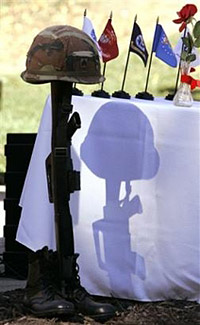 |
 |
 |
 News from Around the Americas | November 2005 News from Around the Americas | November 2005  
US 'Can't Maintain Iraq Troop Levels'
 John P. Gramlich - UPI John P. Gramlich - UPI


| | A display set to represent an individual soldier is shown during a Veterans Day ceremony at a Vietnam Veterans memorial in Eden Park in Cincinnati. (AP Photo/Al Behrman) |
Washington - Unless the Bush administration significantly cuts American troop levels in Iraq next year, the U.S. military's roughly 140,000-strong presence there will become a detriment to America's national security, according to a report released this week.

In the latest instance of foreign policy experts calling for the Bush administration to set a timetable for U.S. troop reductions in Iraq, the Center for American Progress, a think tank headed by President Bill Clinton's former chief of staff John Podesta, Wednesday said the future of America's military hangs in the balance.

"It has become clear that if we still have 140,000 ground troops in Iraq a year from now, we will destroy the all-volunteer army," said the a report written by the center's Lawrence Korb and Brian Katulis. Korb served as assistant secretary of defense under President Ronald Reagan.

The United States must reduce troop levels in Iraq, ideally with 80,000 leaving the country in 2006 and most of the rest leaving by the end of 2007, to avoid losing a broader "struggle against violent extremists" that goes beyond Iraq, the report says.

A timetable for U.S. troop reductions would carry the additional benefit of putting pressure on Iraqi leaders to stabilize the country quickly, Korb said during a panel discussion at the center on Wednesday - an argument recently used by Democrats including Sen. Joe Biden of Delaware and Sen. Carl Levin of Michigan.

However, the Bush administration has given no indication that it will introduce one - and no "responsible administration" would, according to James Dobbins, a panelist at the discussion and director of the International Security and Defense Policy Center at the nonprofit RAND Corp.

"I don't think that any responsible administration would either articulate or allow themselves to be held to a deadline or schedule," Dobbins said, "which doesn't mean that its opposition can't propose it."

The eight page report by Korb and Katulis calls for the redistribution of American military power, taking troops out of Iraq and relocating thousands to Kuwait, Afghanistan, the Horn of Africa and southeast Asia. All National Guard and Reserve troops would return to the United States under the proposed plan.

The new locations of troops currently deployed in Iraq would better confront a global terrorist threat and give reserve units a much-needed rest, according to the report.

"Crouched in the trenches in Iraq, the Bush administration has lost sight of the broader battlefield in a global war against multiple networks of violent extremists," the report says, specifying Somalia, Sudan and the Philippines as "breeding grounds for terrorists."

Beyond forcing Iraqi politicians to compromise with one another when the country's first permanent postwar government takes control in January 2006, the proposed reductions of American troops would also speed up the U.S.-led training of the Iraqi military, Korb said.

The training of the Iraqi military has gone slowly because there has been a lack of motivation, Korb said, noting that American troops regularly enter combat situations with only basic training.

"We take young men and young women and we send them to three months of training and (then) send them to places like Iraq and Afghanistan, so it's not a question of training," he said. "It's really motivation, and if we give them a deadline, that should be the motivation they need. And if it's not, they'll never get it."

Army basic training, in fact, lasts nine weeks and is followed by advanced training in the soldier's job specialty. The Army says advanced infantry training immediately after basic lasts 14-16 weeks, for example, while intelligence training lasts more about 28-29 weeks.

While some experts said setting a timetable for troop reductions could not hurt because the U.S. military would eventually have to leave Iraq anyway, others sharply disagreed.

While the Bush administration is unlikely to announce a timetable for troop reductions, the CAP plan is probably similar to what Bush policymakers have in mind anyway, according to Dobbins, of RAND.

U.S. military planners, administration officials and critics on both the right and left all seem to have different agendas for troop reductions in Iraq, but each group essentially has the same aim - to have most American troops out of the country by the end of 2007, Dobbins said.

"I think (the new report) is exactly what the U.S. military plan is and I think it's exactly what the administration and the president hopes can take place by then," he said. "The problem is that each of these constituencies, if you will, is speaking for a different audience." | 
 | |
 |



